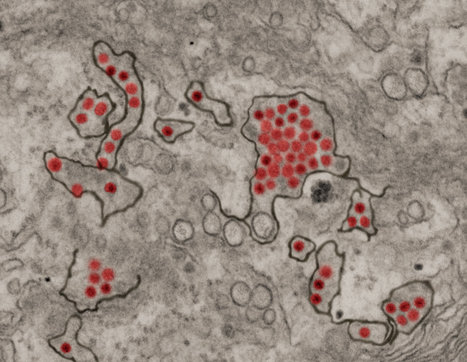Borna disease virus 1 (BoDV-1) causes a bizarre and deadly neurological infection in horses, sheep and other domesticated mammals in parts of Germany, Switzerland, Liechtenstein and Austria. Borna disease was named after a city in eastern Germany where it once killed numerous horses in the late 19th century. Infected animals have been known to engage in strange behaviors, such as smashing their heads into things, as well as “pipe smoking”—an informal term for when animals are eating hay and suddenly stop chewing mid-mouthful, with the uneaten portion protruding like a pipe. But the disease does not appear to spread between horses; they are thought to acquire it from shrews, which can live in hay and secrete or excrete fluids containing the virus.
About 14 years ago, researchers identified the bicolored white-toothed shrew as a reservoir host—an organism in which a virus replicates but does not usually cause illness—for BoDV-1. Horses and sheep are considered “dead-end hosts” that cannot spread the pathogen. For decades, scientists had debated whether the virus is zoonotic, or capable of jumping from animals to humans. Several studies even suggested that it might be present in people with psychiatric disorders such as depression, schizophrenia and bipolar disorder. It was later shown, however, that the viral RNA sequences detected in these studies were likely the result of laboratory contamination, and research on human infections subsided. But in 2015 a related type of bornavirus found in exotic squirrels was implicated in at least four human deaths. Then, between 2018 and 2019, scientists detected the classical bornavirus, BoDV-1, in five people in Germany who suffered serious or fatal encephalitis (brain inflammation caused by infection)—three of whom were recipients of organ transplants and were taking drugs to suppress their immune system. Now, in a study published Tuesday in Lancet Infectious Diseases, researchers have reported eight additional cases of BoDV-1 infection in humans who died of encephalitis. The pathogen appears to have flown under the radar for decades, but the researchers say doctors should be considering it a potential cause in such deaths.
“We now have eight more cases, and these provide additional material for a better understanding of the disease,” says Martin Beer, head of the Institute of Diagnostic Virology at the Friedrich Loeffler Institute in Germany, who was co-senior author of the new study and was also part of the team that reported the squirrel bornavirus infections. The findings confirm that the virus can infect humans and cause deadly encephalitis. “But the risk is, to our opinion, pretty low,” Beer says....
See also The Lancet Infectious Diseases (January 07, 2020):



 Your new post is loading...
Your new post is loading...








